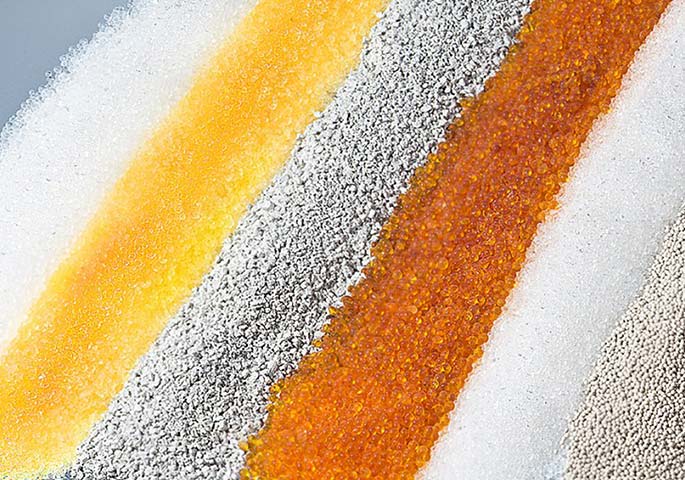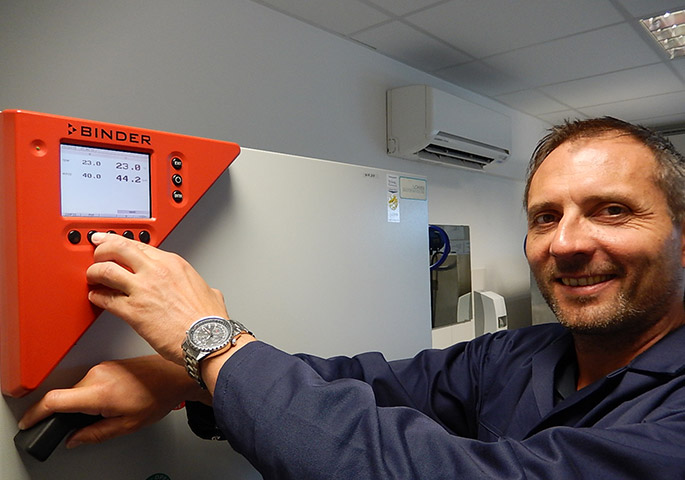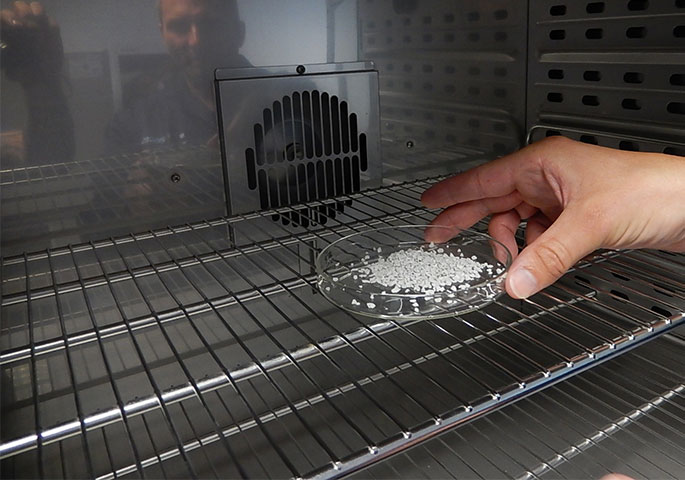Case Study TROPACK Packmittel GmbH
Tasks and objectives:
- Desiccant quality control
- Testing in accordance with DIN 55473
- Testing the absorption capacity of desiccant granules such as clay, silica gel, and molecular sieves
- Homogeneous temperature conditions across test specimens
- Easy operation
BINDER solution:
- KBF constant climate chamber
- APT.line™ preheating chamber technology
- Capacitive humidity sensor with vapor humidification
- Precise humidification
- Adjustable humidity control

In seaworthy packaging, in containers for the automotive industry, in electronic devices, medicines, or shoes: wherever products, packaging, or goods are transported or stored, desiccants are used to provide valuable goods with effective protection against harmful moisture. This is because the microclimate within closed or hermetically sealed rooms can allow the microorganisms living inside to damage or even destroy the room itself as well as the objects it contains. However, these microorganisms require moisture to metabolize. And this is where desiccants come in: If the desiccant draws enough moisture from the room or container, these microorganisms – such as fungi – cannot survive.
Tropack Packmittel GmbH is a leading manufacturer specialized in the production of desiccants for a variety of applications. Their products are manufactured exclusively at their headquarters in Lahnau, Germany. In addition to a wide range of desiccant bags with highly active TROPAgel desiccants, Tropack supplies a variety of other related products from barriers foils and humidity indicators to packaging aids. The desiccant bags are filled with silica gel in a variety of forms – spherical or fine-grained depending on the application. The silica gel is chemically manufactured using a process that involves adding sodium silicate, a glasslike powder made of carbonate and quartz sand, to sulfuric acid.
This creates a gel-like compound that is then dried and sieved. The individual particles are extremely porous as they contain lots of little tunnels that absorb moisture like a sponge. As a result, the desiccant bags have an enormous absorption capacity. Tropack has samples from every consignment examined in the laboratory because the desiccants do not always absorb the same amount of moisture. The company uses a BINDER constant climate chamber from the KBF series to test the absorption capacity of desiccant granules such as clay, silica gel, and molecular sieves. Testing is carried out in accordance with DIN 55473, the technical delivery conditions for desiccant bags. The absorption capacity determines how many grams a bag is filled with. „Once the absorption capacity of the material is identified, the concrete filling quantity per desiccant unit is determined. In accordance with DIN 55473, the material must be able to absorb at least 6 g of water vapor per unit,“ said Siering, QA/PP and Quality Manager at Tropack. The absorption capacity of the desiccant granules is examined in the constant climate chamber at 40 percent RH and 23 °C. „The straightforward unit handling and longterm constant temperature and moisture values were important to us,“ said Heiner Siering. „The constant climate chamber from BINDER fully meets the requirements.“ The innovative APT. line™ preheating chamber technology in the unit guarantees homogenous climate conditions for the entire test sample – even when the unit is fully loaded. The capacitive humidity sensor with steam humidification ensures precise humidification and finely adjustable humidity control. What‘s more, the desiccant bags can also be used as a helpful tool in everyday life: If your cellphone gets water damage; in musty, damp sports bags; for steamed-up car windows; and as protection against oxidization in jewelry boxes or toolboxes.


Key features of the KBF series:
- Temperature range 0 °C to 70 °C
- Humidity range 10% to 80 % RH
- APT.lineTM preheating chamber technology
- Controller with time-segment programming
- Tightly sealed inner door made of tempered safety glass
- Stainless steel rack
- Access port with silicone plug
- Sizes available: 115, 240, 720, 1020 liters